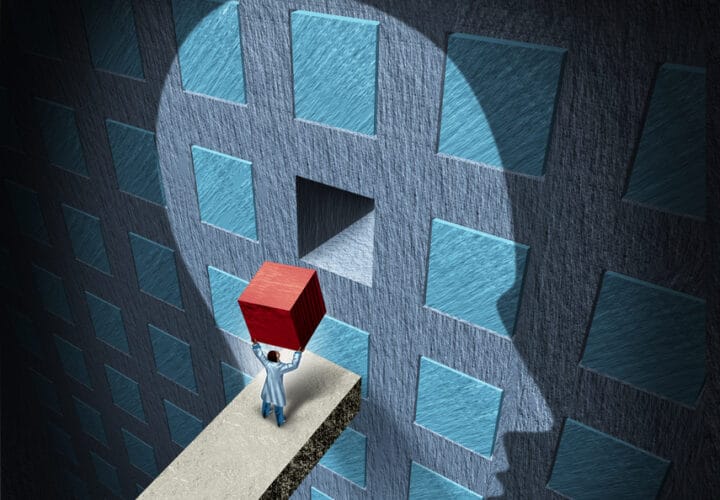A neurologist shares what patients and care partners should know about navigating the healthcare system. This is part one of a three-part series on what to expect with a dementia diagnosis.
Most neurologists dread telling patients they have Alzheimer’s disease or another form of dementia. I am no exception. But 16 years ago, I discovered something that is much more difficult than giving the diagnosis: hearing your loved one receive it. My father was diagnosed with Alzheimer’s disease in 2002.
Walking beside my parents on the journey through dementia was enlightening. We experienced fear, denial, uncertainty, sadness and at times, joy. I have become more compassionate and empathetic and now understand the difficulties care partners go through as they navigate the healthcare system.
Getting a Diagnosis
If you or someone you love is experiencing problems with thinking and memory that seem abnormal for their age, it’s time to schedule a visit to a healthcare provider. Failing to recognize or denying the symptoms can be a barrier to getting help. Loved ones or those exhibiting cognitive impairment should openly, yet compassionately discuss the issue and plan a doctor’s visit. But sometimes it’s easier said than done: Getting someone to agree to an initial evaluation may be difficult. Some family members have success suggesting a medical follow-up visit for other issues (such as back pain or diabetes), then contact the provider beforehand, requesting a cognitive evaluation of their loved one as well.
Finding the Right Doctor
If the person agrees to see a healthcare provider, I recommend starting with primary care. If you don’t have a primary care provider, seek one with board certification, high ratings online (Vitals.com, Healthgrades.com) and good word-of-mouth recommendations. State and county medical societies can offer guidance as well. Ideally, you’ll have a doctor that knows your medical history and has a baseline assessment of cognitive function.
The Assessment
Primary care providers can use one of several in-office evaluations to measure cognition. You might hear names like Mini-Cog, MMSE (Mini-Mental Status Exam), SLUMS (St. Louis Mental Status Examination) and MoCA (Montreal Cognitive Assessment). And then you might wonder why there are so many tests to measure the same thing. Depending on how the doctor assesses the patient initially, he or she might use one over another. The MMSE test is the most commonly used, but it might be less effective than the MoCA at identifying mild or early cognitive deficits—especially in people who are highly educated with a high cognitive reserve—or those associated with Parkinson’s disease. The Mini-Cog takes less time to perform and might be able to better distinguish what kind of dementia diagnosis you could be dealing with—Lewy body vs. Alzheimer’s, for example.
Talking about changes in memory the patient has experienced (both from the patient’s perspective and those close to him or her) is the most important part of the clinical assessment, but other tests should be performed. Those include:
- CT or MRI scan will show if there are physical changes happening in the brain
- Vitamins D and B12 should be checked with a blood test to rule out if a deficiency is causing memory problems
- Lab tests to check for renal or hepatic (liver) dysfunction, thyroid disease or sleep apnea, all of which affect your ability to concentrate and memory
- Neuropsychological testing that screens for depression or other psychological factors that can affect memory and behavior
In some cases, FDG-PET scanning, which can use a radioactive tracer to bind to brain amyloid deposits, can be helpful to distinguish Alzheimer’s disease from other causes of cognitive impairment. Amyloid is a biomarker of Alzheimer’s, and seeing how much is in the brain is helpful in a diagnosis. If that scan is ordered, the FDG will be injected into a patient’s vein, then a machine scans their brain while they lie on their back for around an hour. But cost and availability limit the use of this technology. Lumbar puncture to detect cerebrospinal fluid levels of amyloid and tau protein, another marker of Alzheimer’s, also may be performed if the diagnosis remains in question; in most cases, the history, physical and neurological/cognitive evaluation from a provider who is experienced in dementia diagnosis, along with with blood work and imaging, should be enough for a diagnosis.
This article originally appeared on BeingPatient.com on July 10, 2018.



My hubby has had parkinsons for about 11 years. Was diagnosed with Lewybody dementia,with a memory test 3 years ago . He has been put on different meds for his dementia and anxiety all with negitive results he cannot take any benzo or narcotics. He now is on carba levodopa 2 tabs 5x a day and 100mg.THC edibles every four hours. Which helps with his anxiety.his physical heath is good his mental comprehension /memory/reality is rapidily declining . I miss my guy,and hope for something to stop the dementia from progressing
It’s impressive that you are getting thoughts from this article as
well as from our argument made at this time.